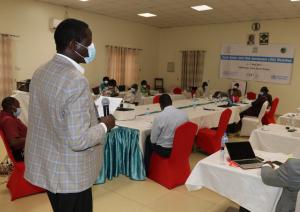Joint Risk Assessment (JRA) accomplished for effective control of zoonotic diseases in South Sudan
Juba -to improve the prevention and control of zoonotic diseases, the World Health Organization (WHO) in collaboration with the other tripartite partners, the United Nations Food and Agricultural Organization (FAO) and the World Organization for Animal Health (OIE) supported the Government of South Sudan to convene a Joint Risk Assessment (JRA) involving several sectors and stakeholders including: the Ministry of Health; Ministry of Livestock and Fisheries, Ministry of Environment, Ministry of Agriculture and Food Security, the Ministry of Wildlife, the South Sudan Veterinary Association, University of Juba, and Upper Nile University. This was the first JRA to be conducted in the Republic of South Sudan.
The assessment was intended to identify zoonotic diseases of significant public health and veterinary concern in the country, reviewing their burden, the associated risks, and coping capacities to facilitate identification of practical management options and communication messaging for effective and sustainable control.
The threat of zoonotic diseases is on the rise globally with over 70% of all emerging and re-emerging infections being zoonotic; diseases that spread between animals and humans and pose risks to animal, public and environmental health. South Sudan is endemic to several zoonotic diseases and public health threats including rabies, anthrax, brucellosis, bovine tuberculosis, Rift Valley Fever, yellow fever, and Sudan ebolavirus species. The other challenges that the country faces at the human – animal – wildlife interface also include antimicrobial resistance (AMR), food insecurity and environmental pollution.
To further underscore the need for effective control of risks at the human-animal-environmental interface, the country boasts of a large livestock population that was estimated at 36 million from the 2009 FAO / Ministry of Livestock and Fisheries estimates and is certainly much higher than that at the present time. Livestock is a major source of revenue, livelihood, food, societal status, and cultural value for many among the pastoral ethnic groups in the country.
The Joint External Evaluation (JEE) of national capacities as a recommendation for Member States under the International Health Regulations (IHR,2005) that was completed in 2017 underscores the need to strengthen the policies, governance, and prioritization of zoonotic diseases for effective control. Consequently, these priorities including the joint risk assessment are included in the South Sudan National Action Plan for Health Security (NAPHS) 2020-2024.
During the South Sudan JRA that ran from 4th to 7th May 2021, multisectoral and multidisciplinary national Ministries and stakeholders choose to conduct the JRA for rabies, Rift Valley Fever (RVF) and antimicrobial resistance (AMR) as priority threats at the human-animal-environment interface. The major risks associated with these respective hazards were identified and practical management options and communication messages were proposed. During the meeting, stakeholders also agreed to fast-track the formalization of the multisectoral one-health platform to coordinate implementation of one-health activities and recommendations from the JRA.
“Given South Sudan’s increased vulnerability to zoonotic diseases, strengthening national multisectoral capacities for cross-sectoral surveillance, response and control systems is paramount for early detection and rapid containment of zoonoses to reduce needless illnesses and deaths”, said Dr John Rumunu, Director General for Preventive Health Services. These sentiments were reiterated by the other stakeholders that participated in the workshop and committed to work together to strengthen the control of zoonotic diseases and other threats at the human-animal-environment interface in high risk populations in South Sudan.
The tripartite partners, WHO, FAO, and OIE on their part committed to provide the requisite technical assistance and mobilize the resources needed to institutionalize the multisectoral one-health approach for sustainable control of threats at the human-animal-environment interface in South Sudan.
Notes to editors:
Zoonotic diseases are diseases that spread between animals and humans. The concept of zooanthroponosis (reverse zoonosis) whereby humans infected with pathogens can also infect animals. The most notable recent example being, mink populations farmed under intensive conditions in Europe becoming infected with SARS-CoV-2 virus, also recorded in some captive wildlife species (felines, primates) kept in zoological settings. This can become significant in terms of genetic reconstitution and emergence of virus variants of potential concern. Effective prevention and control of zoonotic disease relies on a One Health approach and joint risk assessment is one of many operational tools that requires engagement of all relevant sectors including public health, animal health, and the environment to identify and prioritize risks and make recommendations on cross-sectoral measures and communication messages for effective control of zoonotic diseases and public health threats.
Technical contacts:
Dr Wamala Joseph Francis, Email: wamalaj [at] who.int
Dr Alice Igale Lado, Email: ladua [at] who.int
Ms Baya Sheila, bayas [at] who.int
Dr Ryan Caroline: ryanc [at] who.int
Dr Jayne Byakika Tusiime: tusiimej [at] who.int
Dr Nimaya Mogga: Mogga [at] fao.org
Communications Officer
Mobile: +211 921 647 859
Email: ebrahimj [at] who.int
Communication Officer
Mobile: +211 921736375
Email: atema [at] who.int




